
New clients, unlock 10% off all plans 🔥 at checkout with code: CEO10SPECIAL (Limited Time Offer)
New clients, unlock 10% off all plans 🔥 at checkout with code: CEO10SPECIAL (Limited Time Offer)






A report from the society of human resources management quotes, “behavioral interview questions are an effective interview technique various organizations use, making them an essential part of the hiring process when evaluating a candidate’s work experience and work style.”
What are behavioral job interview questions, and what’s your best approach to answering them?
Behavioral interview questions are designed to give hiring managers insight into your behavior and personality and to learn how you would handle job-related issues.
While interviews can be high stakes, some interview questions can be fun. Some interview questions ask for a good story starring you as the main character.
This article will discuss these interview questions and review employers’ most common behavioral interview questions.
Additionally, I’ll provide tips on preparing and responding effortlessly when you’re asked to give examples of how you handle workplace situations.
By researching many behavioral interview questions, you can improve yourself and prepare for your interview.
Behavioral interview questions are non-technical questions focused on you. Interestingly, it is something you can prep for in advance.
You have the answers already. We only need to find the correct stories and polish them up.
Follow our tailored guide to help you master the art of answering behavioral interview questions.
You might like: 15 Top Situational Interview Questions and Answers
In the real sense, the common idea behind behavioral interview questions centers on an individual’s personality.
These questions are asked to assess a job seeker’s attitude on how he thinks and reacts to challenging situations.
The behavioral interview questions center on practical situations and ways an employee was able to handle issues by outlining experiences.
Many employers ask more of these questions as they find them relevant and interactive during the interview process.
The hiring manager will be able to get a summary of your abilities which may be challenging to ask and assess directly.
Via your response, many hiring managers will be exposed to the hard skills that helped you arrest difficult situations.
They will also find it easy to access your mindset and soft skills as you answer some of these questions.
Though not yet proven, some hiring managers believe that an employee’s past performance can contribute to future organizational success.
“One report indicated that prior work experience – essentially, past behavior – didn’t guarantee a solid performance at a new company, even if the new hire had related experience. But a different study showed that behavioral interviewing was 55 percent predictive of future behavior at work, while traditional interviews were a mere 10 percent predictive.“
As hiring managers take turns in asking more behavioral interview questions, you must prepare ahead to stay confident and interactive.
You might like: How To Answer “Where Do You See Yourself In 5 Years?”

Certainly! We’ve accomplished a milestone in our study.
At this point, we’ll explore a simple way you can prepare for behavioral interview questions.
According to a career advice by novoresume, the easiest way to answer these questions is to follow the STAR method.
Complying with the STAR method, each interview answer should use the following structure:
S for Situation. Describe the situation where everything happened.
T for Task. Describe the task you had to complete to solve the problem/issue at hand.
A for Action. Explain what actions you took to complete the task, as mentioned earlier.
R for Results. Talk about the results of your actions, and try to be as detailed as possible. How did your actions lead the company or organization to function better?
Below is an example of what a good answer looks like using the STAR method:
Q: Give us an example of how you handled a challenge in the workplace.
Situation: Around the time I started working at Company X, the team I was working with was just finishing up on a very important project on a tight deadline. They had to review everything before submitting the work to the client, and my manager didn’t have a lot of time to pay attention to me to make sure I was caught up to speed.
Task: Everyone around me was constantly working, and because of the timing, they didn’t seem very approachable. So, to make sure I didn’t get left behind, I had to prove myself and take initiative.
Action: My plan was simple. I wanted to talk to my manager and a few of my colleagues whenever they had time (e.g., over lunch, getting coffee together). Then, I would try to get to know them in a different environment and also learn about the company better too. In the meanwhile, I would always go over my onboarding material and resources to get better at my job.
Results: In the end, I’m glad to say everything worked out and I actually made a few good friends too. By the time my manager came around to review my work and talk about the next steps – I already knew most of it and the company’s main clients in detail. And I also knew my colleagues who I’d be working with too. If anything, he was a bit surprised, but ultimately, happy I didn’t fall behind. This saved him a lot of time, something he was very grateful for.
Guess it was that simple?
Now, below is a list of 50+ behavioral interview questions employers commonly ask to help them evaluate your work experience, customer service skills, communication style, and leadership principles under real situations to make informed hiring decisions.
Note: The next topic of this article will cover the top 10 behavioral interview questions and sample answers.
Practice, practice, practice until you’re 100% ready for any behavioral question the recruiter can throw at you.
You might like: (Q&A) Predictive Index Test: What it is and How to Prepare (Full Guide)
1. How do you prioritize projects under pressure?
2. How would handle your schedule when it’s interrupted?
3. Have you ever bent company policy to satisfy a client?
4. How have you handled setbacks at work?
5. What makes an ideal coworker in your eyes?
6. How do you handle job training if it’s going poorly?
7. Have you ever calmed down an angry client? How?
8. Tell me about some regrets in your previous job?
9. Describe a time when it was especially important to make a good impression on a client. How did you go about doing so?
10. Give me an example of a time when you didn’t meet a client’s expectation. What happened, and how did you attempt to rectify the situation?
11. Tell me about a time when you made sure a customer was pleased with your service.
12. Describe a time when you had to interact with a difficult client or customer. What was the situation, and how did you handle it?
13. When you’re working with a large number of customers, it’s tricky to deliver excellent service to them all. How do you go about prioritizing your customers’ needs?
14. Give me an example of a time you managed numerous responsibilities. How did you handle that?
15. Describe a long-term project that you kept on track. How did you keep everything moving?
16. Tell me about a time your responsibilities got a little overwhelming. What did you do?
17. Tell me about a time you set a goal for yourself. How did you go about ensuring that you would meet your objective?
18. Tell me about a time an unexpected problem derailed your planning. How did you recover?
19. Tell me how you communicated with your previous managers?
20. Give an example of when you persuaded someone at work towards your point of view. Was it a positive outcome?
21. Can you talk about a time when you were unable to get your point across effectively? What contributed to this? Have your communication skills improved?
22. Describe a time when you had to give a presentation in a group setting.
23. Tell me about a time when you had to deal with a difficult client or customer. How did you handle the stressful situation?
24. Can you talk about a time when you had to deliver bad news to someone? What did you do to prepare and what was the outcome?
25. Tell me about your proudest professional accomplishment.
26. Describe a time when you saw a problem and took the initiative to correct it.
27. Tell me about a time when you worked under either extremely close supervision or extremely loose supervision. How did you handle that?
28. Give me an example of a time you were able to be creative with your work. What was exciting or difficult about it?
29. Tell me about a time you were dissatisfied in your role. What could have been done to make it better?
30. Tell me about a time you were under a lot of pressure at work or at school. What was going on, and how did you get through it?
31. Describe a time when your team or company was undergoing some change. How did that impact you, and how did you adapt?
32. Tell me about settling into your last job. What did you do to learn the ropes?
33. Give me an example of a time when you had to think on your feet.
34. Tell me about a time you failed. How did you deal with the situation?
35. Tell me about a time when you made a mistake or overlooked a solution to a problem and learned from it. What have you done as a result of this experience?
36. Can you talk about a time when you had to embrace a new system, technology, process, or way of thinking that was a major departure from the previous way of doing things? Did it become a success story?
37. Tell me about a time when you were assigned a task outside your normal job duties. How did you handle the assignment? Describe the outcome.
38. Describe a time when you had to work with a difficult coworker. How were you able to handle interactions with that person?
39. Give an example of when you needed information from a coworker who wasn’t responsive? What did you do?
40. Describe a time when you worked as part of a team on a project. Explain your role within the team and the actions you took to contribute to the team.
41. Talk about a situation when your team members disagreed with you. How did you handle it?
42. Can you tell me about a time when a coworker was not doing their work on a difficult project? What did you do?
43. Describe a time when you and your team members were forced to compromise. Explain the results.
44. Have you ever been in a situation where you had to motivate others to take action to support a major reorganization? How did you handle that?
45. Think about a time when you were overwhelmed and stressed. How did you handle it?
46. Describe a project you planned. Explain how you organized and managed the assignment.
47. Have you ever worked on multiple projects at the same time? How did you manage your time and what were the results?
48. Tell me about a time when you were able to delegate an important task that succeeded.
49. How do you estimate a reasonable time to complete a task?
50. Describe a situation when your superior was not around and a problem developed. How did you handle the problem? What were the results?
51. Tell me when the last occasion you asked for direct feedback from your manager and why?
52. Is there something that would motivate you to move from your current position?
53. What is a big career goal that you achieved recently?
54. Was there a time you were passed over for promotion? Was it fair?
This behavioral question allows hiring managers to learn about your ability to cope with stress and your coordination when you have many pressing activities on your desk.
Example Answer:
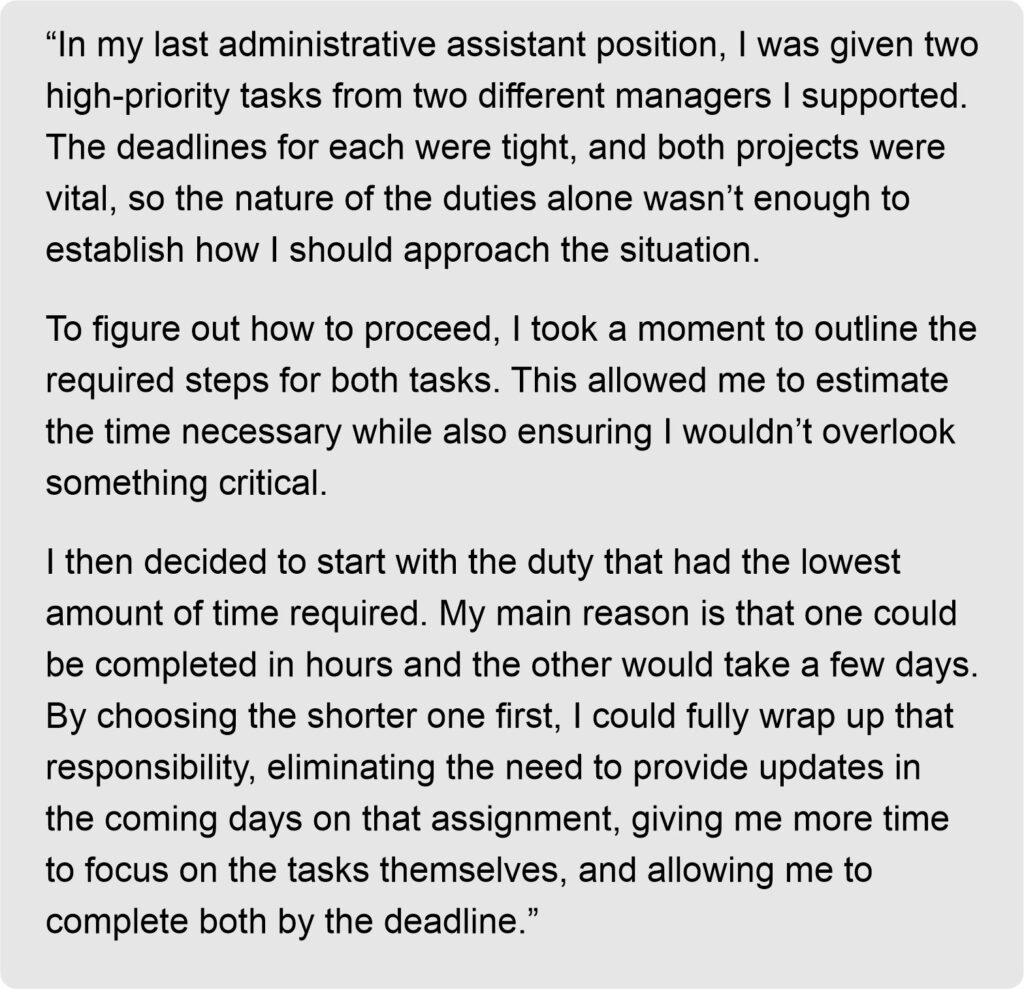
You might like: 450+ Words To Describe Yourself: Interview Tips
This question reflects how stress can retard employees’ performance in their workplace.
Therefore, employers wish to understand how you can handle stress when faced with challenges.
Example Answer:
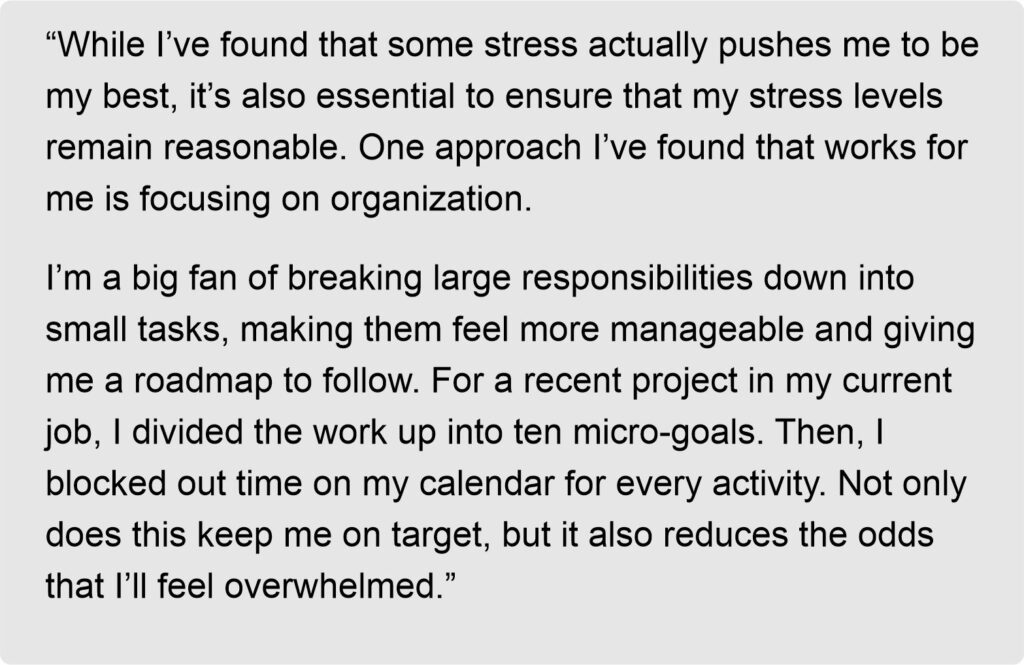
This is one unavoidable circumstance that occurs between workers and clients or even between coworkers.
It is one of the most common behavioral interview questions asked.
While employers wish to know your best approach to handling such situations, it’s also your chance to talk more about your self-reliance and interpersonal skills.
Example Answer:
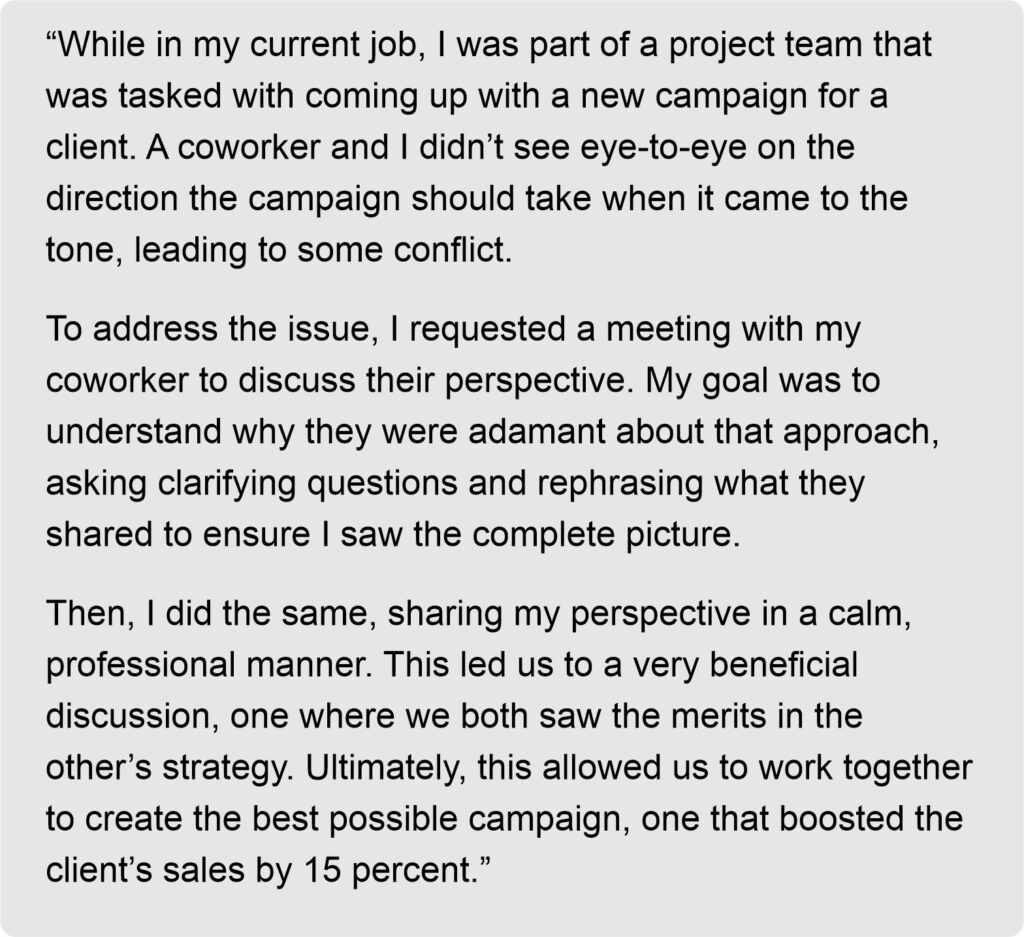
Here is another critical behavioral question.
It points out unexpected events, whether the pace at your workplace is fast or slow.
The hiring manager checks your agility to know if you can adapt when needed.
Example Answer:
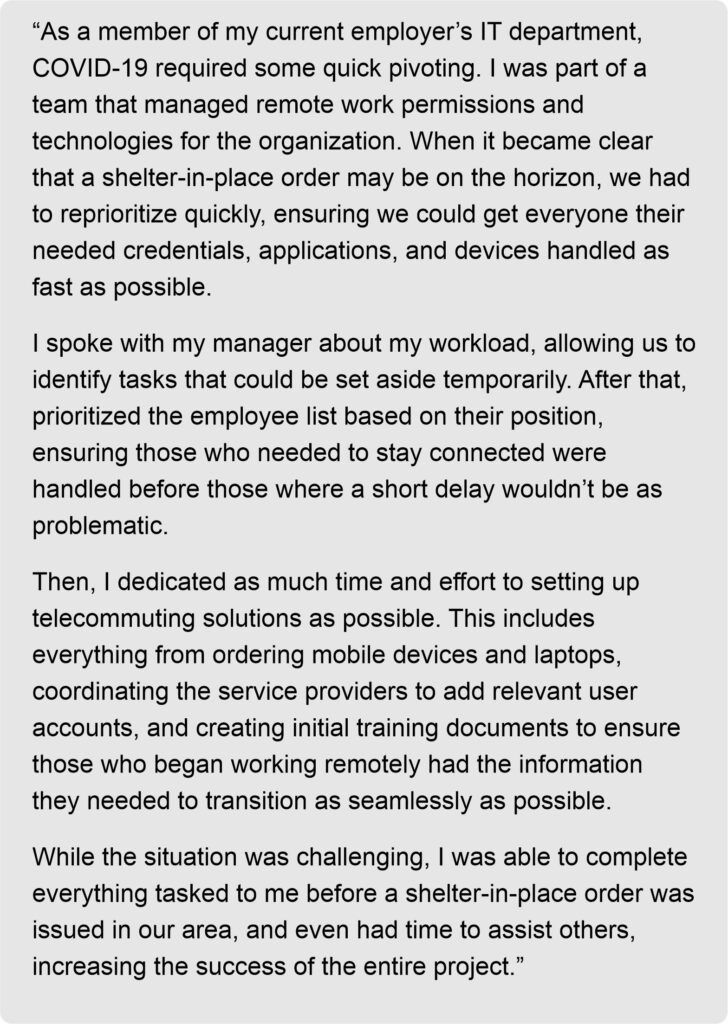
Hiring managers delight in asking this type of behavioral question, knowing how uncertain it might make an employee feel.
This question aims to identify a time when things went wrong, leading to a poor outcome.
The key fact is that hiring managers want to know how best you can handle mistakes and recover from failure while accessing your honesty, self-awareness, and accountability.
Example Answer:
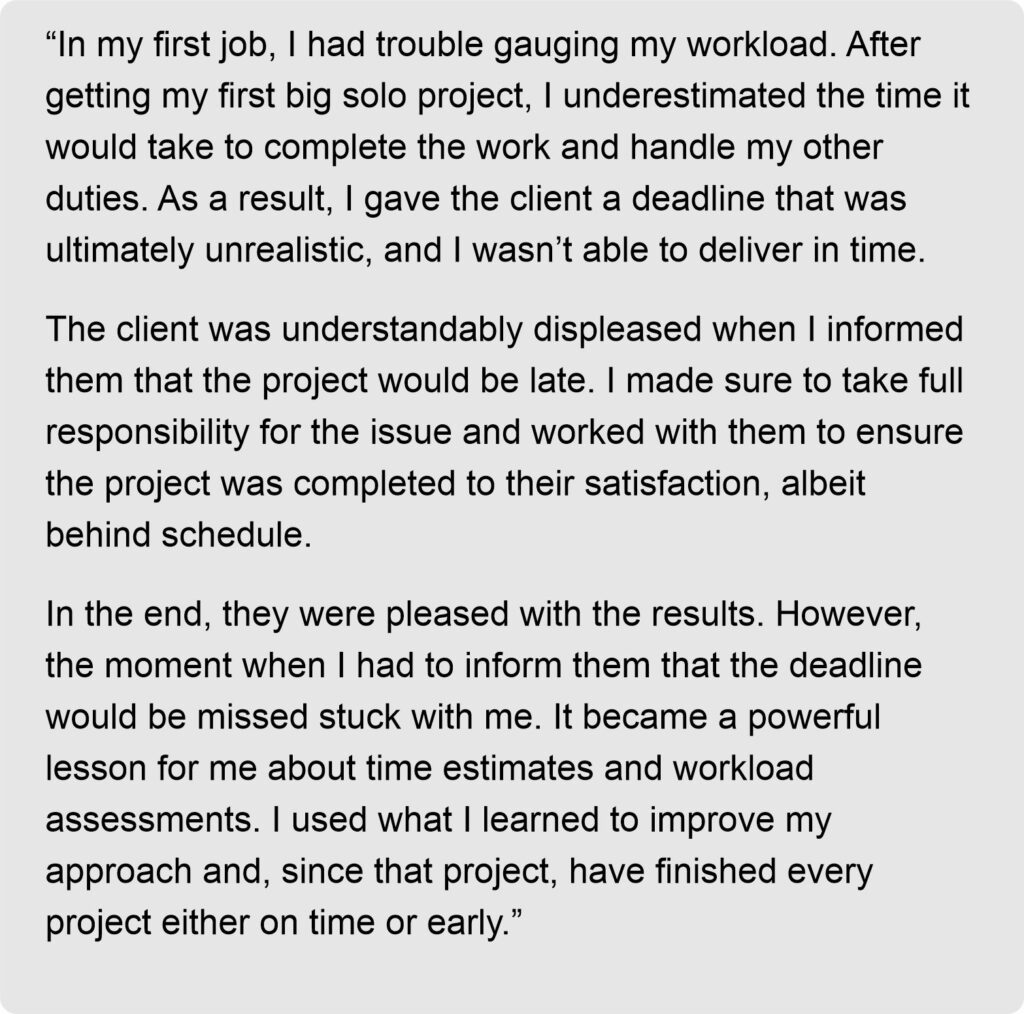
This question is asked to assess your leadership skills and how well you can manage other coworkers under you as you all work towards achieving the same goal.
Example Answer:
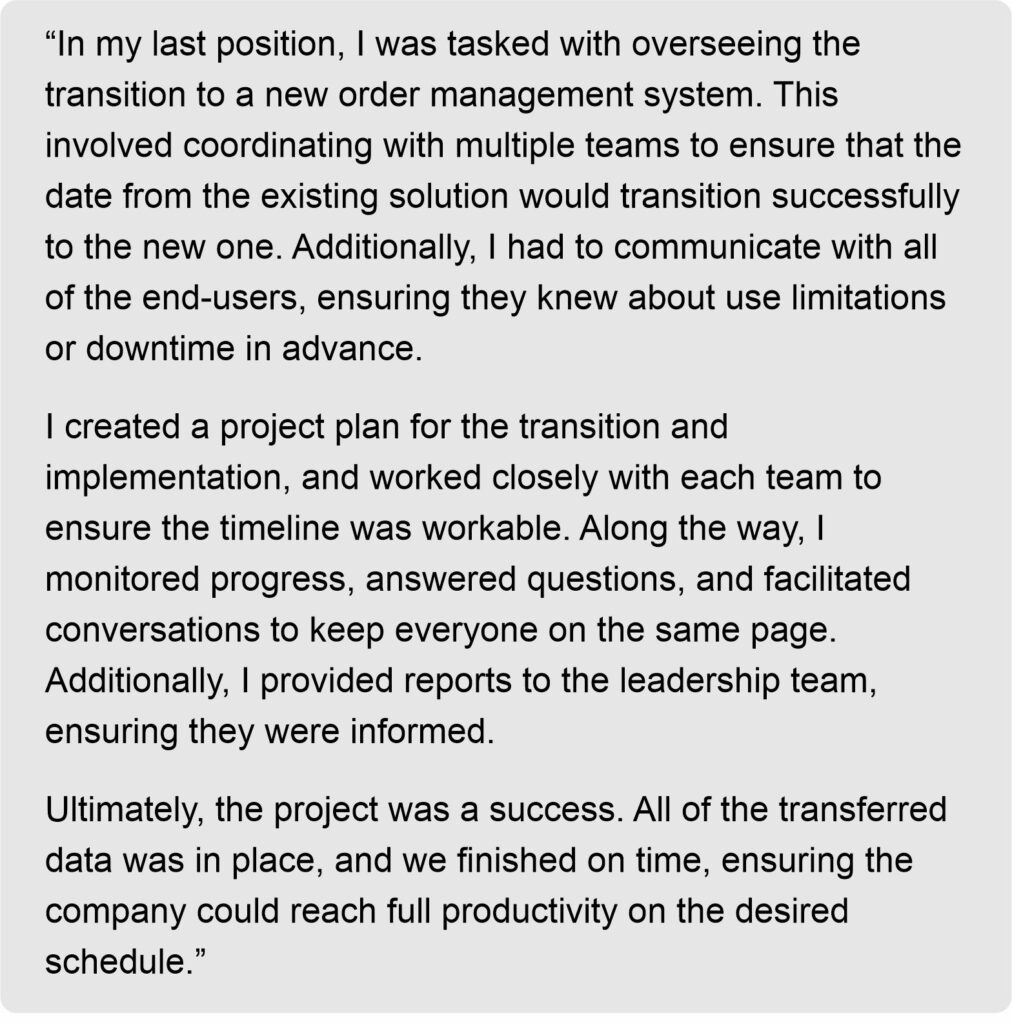
You might like: How to say you were fired on an application
If you don’t have an example from work, that’s okay. You can use one from school or a volunteer experience instead.
As long as you took the reins and guided others, it’s an excellent way to answer the question, even if the project was relatively small and limited in scope.
This behavioral question illustrates an aggrieved customer landing their frustrations on you.
The hiring manager wants to know how well you can handle a critical situation like this and what technique you will employ to solve the conflict.
Example Answer:
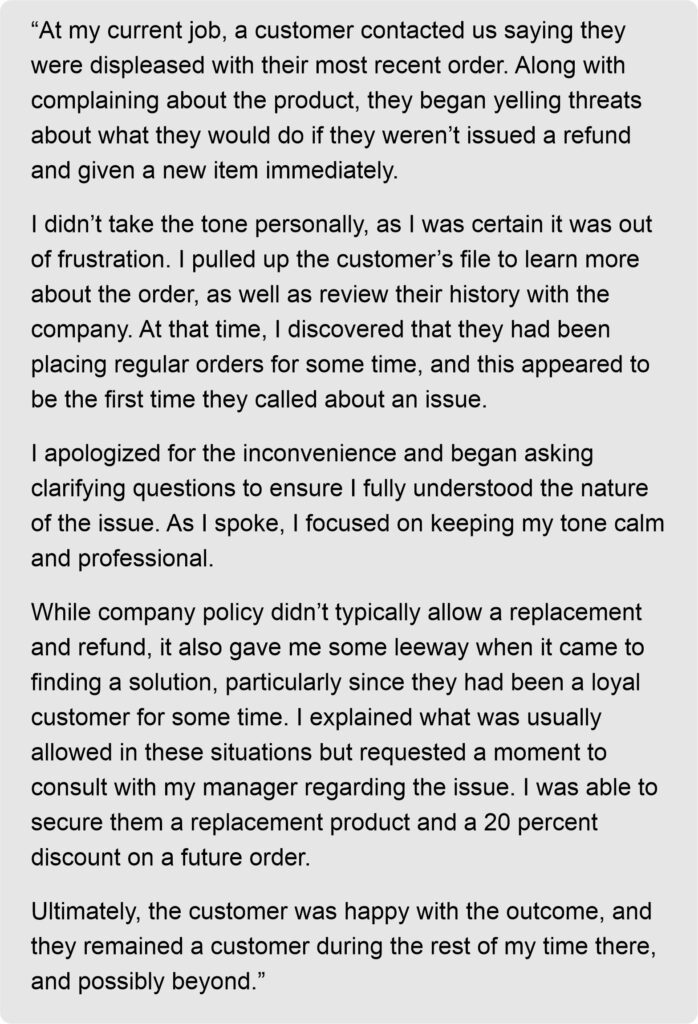
You might like: 7 Tips for The Morning of Your Interview
Most hiring managers know that goal-setting is a powerful skill that can facilitate greater success.
As a result, they want to see how candidates view goal-setting, leading them to ask this question.
Example Answer:
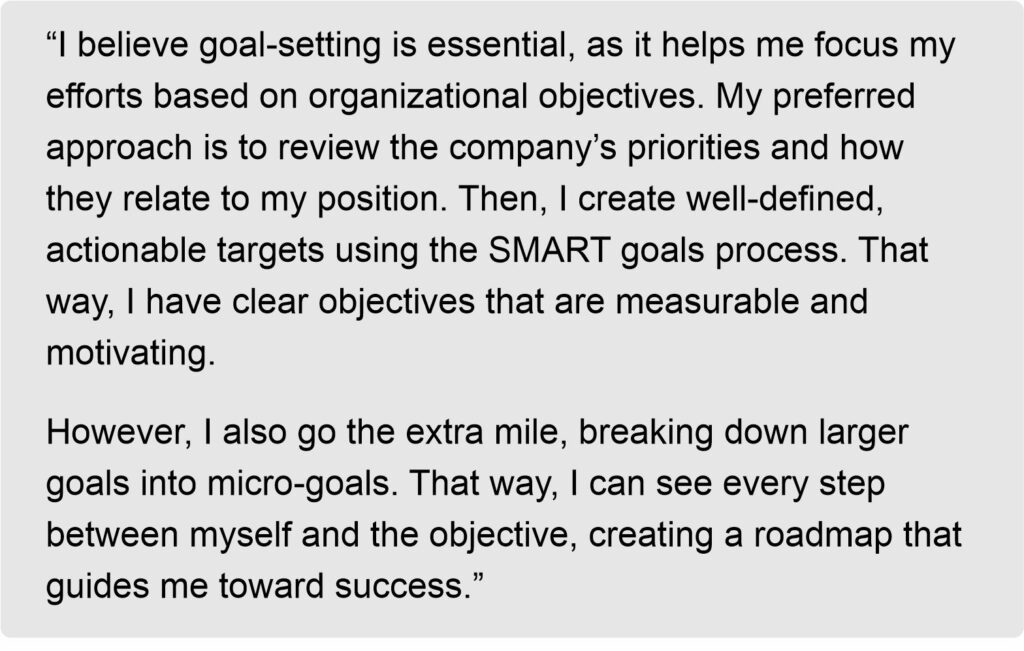
Here are the two areas the question focuses on…
First, it allows the hiring manager to learn more about your values. Secondly, it gives them insights into your skills and achievements, which helps them determine if you fit the position.
Example Answer:
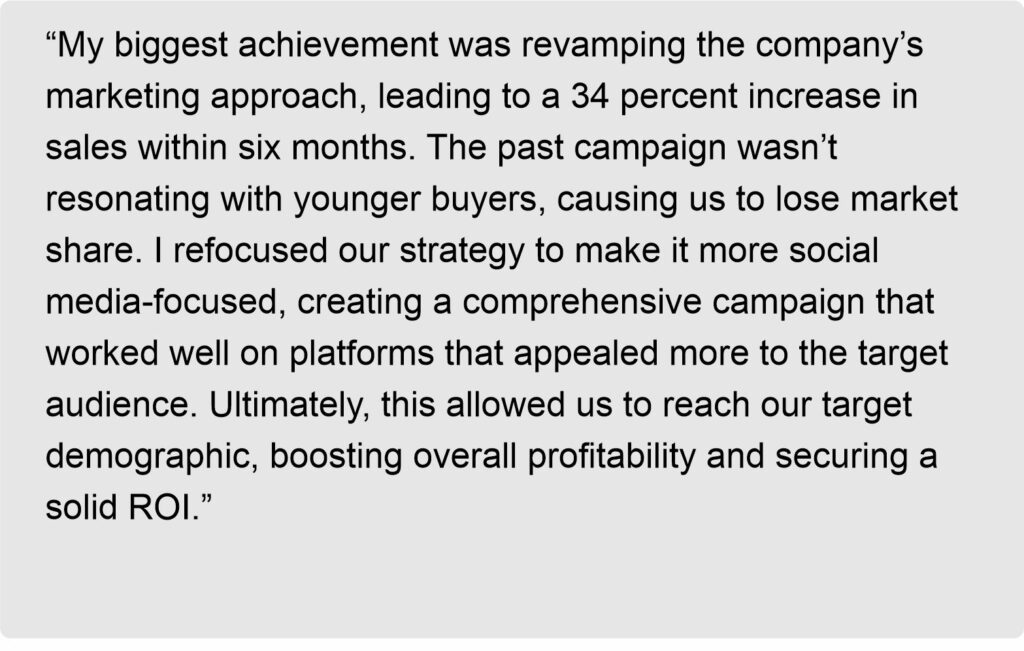
This question is meant for those applying for management positions and aims to explain the difficult choice they have to make even without team members’ involvement.
Hiring managers ask this question to check your capabilities on how well you have handled decision-making situations in the past.
Example Answer:
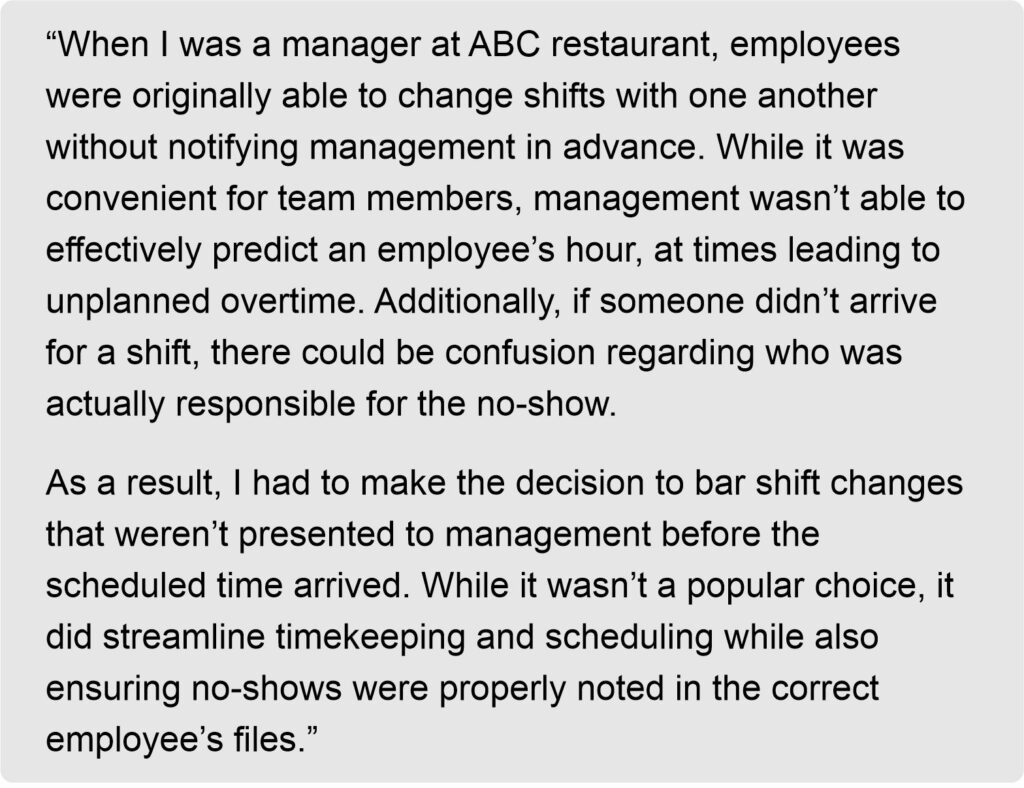
You might like: (Q&A) How Long Does A Background Check Take? – Full Guide
During a behavioral interview, you’ll be presented with a possible situation, then asked how you have responded to similar concerns in the past.
This situation might be challenging, like disagreeing with a colleague, prioritizing multiple projects, etc.
Scaling up on your interview skills, in general, will help you answer these behavioral interview questions quickly and sail through to the next round.
So, get those stories ready and practice as much as possible to keep you at a competitive advantage.
Before you can share your time with a company during an interview, your resume must be optimized for the job. CEOMichaelHR has expert writers in every industry that can help you win interviews.
Share
Further Reading
*The names and logos of the companies referred to in this page are all trademarks of their respective holders. Unless specifically stated otherwise, such references are not intended to imply any affiliation or association with CEOMichaelHR.
Land interviews 3x faster while submitting fewer resumes
Copyright © 2025, ceomichaelhr.com.
All rights reserved.
Land interviews 3x faster while submitting fewer resumes
Copyright © 2025, ceomichaelhr.com.
All rights reserved.

Learn the same techniques our expert resume writers have used to get thousands of clients closer to their next job
Unlock expert resume tips, start landing multiple interviews!

Stay connected to receive powerful career insights, updates, and inspiration that’ll help you hit your career goals.